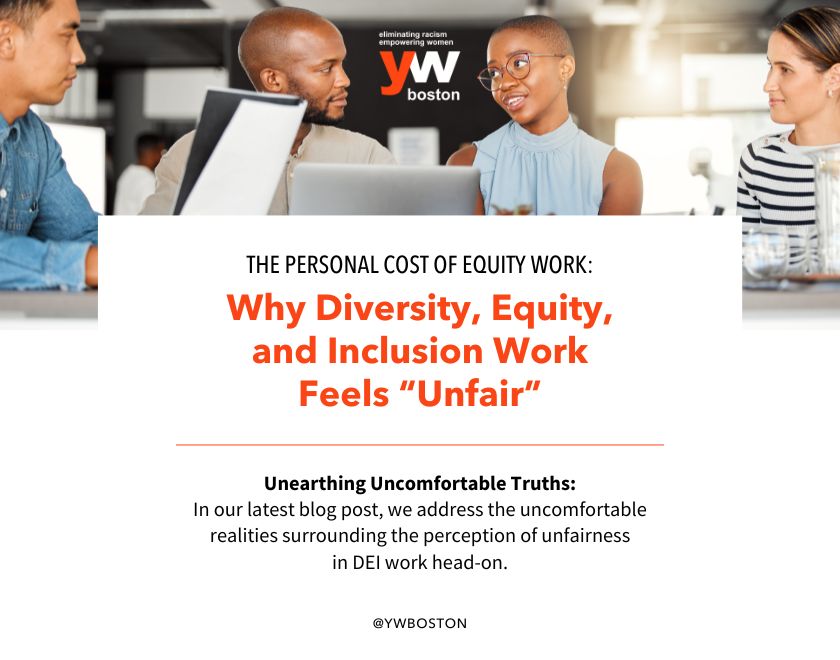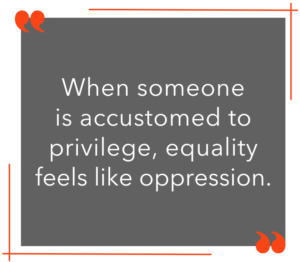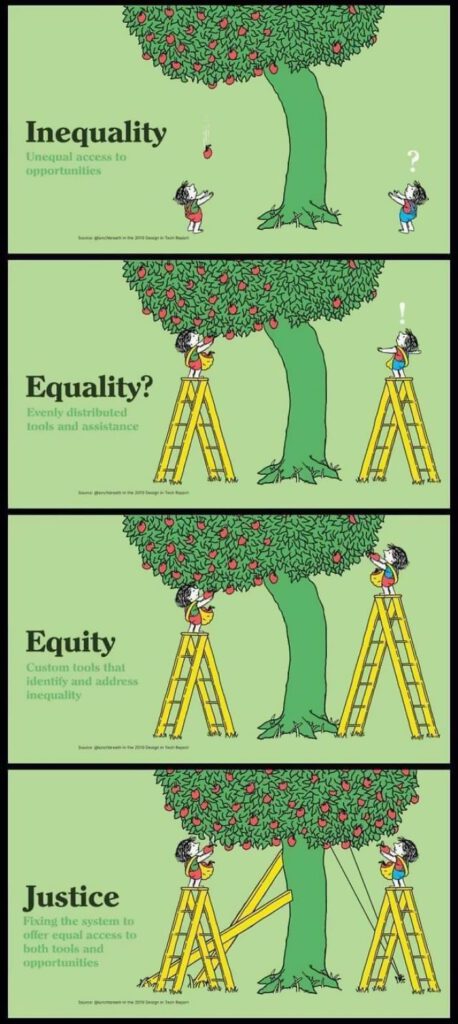
October 3, 2022
By: Nina Ross
The personal cost of equity work: Why diversity, equity, and inclusion work feels “unfair”
While engaging partner organizations and individuals in our DEI Services, we’ve observed that a sense of “unfairness” can prevent people from embracing the work. Individuals may believe that advocating for greater equity will come at their own expense, and thus be unwilling to participate.
This increasingly popular phrase may be familiar to DEI practitioners, social justice advocates, and even the general public: “When someone is accustomed to privilege, equality feels like oppression.” This statement can be difficult to comprehend because it requires historical knowledge, an understanding of systemic inequity, and even the unpacking of uncomfortable feelings.
When someone hasn’t examined their own social identities and the advantages and disadvantages of inequitable systems, they may interpret the statement as “you’ve never faced hardships; your life is easy.” When, in fact, it means that, while you may have faced difficulties as a result of one of your social identities (such as class, gender, race, or ability), one or more of your other identities has benefited or shielded you from compounded inequities.
The idiom also draws attention to a common contradiction among those who oppose diversity and inclusion. Opponents are quick to label DEI initiatives as “coddling” or accuse those who advocate for them of being “sensitive.” (Consider the weaponization of the terms “snowflake,” “social justice warrior,” and “political correctness.”) There is an irony in being upset about people of color in fantasy films and protesting greater representation in media while failing to recognize that this is only a small victory for communities who are literally fighting for their lives, experiencing hate crimes, police brutality, workplace discrimination, and shrinking civil rights.
In a workplace context, consider those who complain about “diversity hires,” accusing them of everything from benefiting from “lowered standards” to taking jobs away from “more qualified” applicants. In contrast, hiring policies that prioritize DEI aim to remove structural barriers that affect those with systemically excluded identities. Such as being less likely to find a job if you have a “hard-to-pronounce” name, or being half as likely to hear back from an employer if you’re a person of color.
People often experience discomfort when engaging in social justice work, because it challenges long-held beliefs and we realize we have benefited from the harm done to others, even when we were not directly responsible. To understand why diversity, equity, and inclusion (DEI) efforts can feel unfair, we must first understand oppressive systems, intersectionality, the difference between equality and equity, and the origins of inequitable systems, including how they manifest today. Let’s dive deeper…
“Privilege is when you think something is not a problem because it’s not a problem for you personally.”
What is privilege?
At YW Boston, we define privilege as the social, political, economic, and psychological benefits of membership in a group that has institutional and structural power. It’s simpler to think of privilege in terms of the advantages or disadvantages that your environment and social identities provide you with.
Equality vs. equity, what’s the difference?
A number of misconceptions cause the sense of unfairness that can accompany social justice work. One is that inequities do not exist today and that oppressive systems, such as racism, are a thing of the past. The second is a misunderstanding about what oppressive systems actually are. Third, is the belief that we are all on the same playing field and that equality is a desirable solution.
Equality means that every individual or group of people has access to the exact same resources regardless of their needs or current circumstances.
Equity, however, recognizes unique circumstances by taking into account structural factors that benefit or harm certain groups, therefore employing different approaches to ensure equitable access to resources and opportunities.
This concept has been illustrated by many scholars and practitioners.
The fallacy of reverse racism
The National Education Association defines reverse racism as:
“A concept based on a misunderstanding of what racism is, often used to accuse and attack efforts made to rectify systemic injustices. Every individual can be prejudiced and biased at one time or another about various people and behaviors, but racism is based on power and systematic oppression. Individual prejudice and systemic racism cannot be equated. Even though some people of color hold powerful positions, white people overwhelmingly hold the most systemic power. The concept of ‘reverse racism’ ignores structural racism, which permeates all dimensions of our society, routinely advantaging white people and disadvantaging people of color. It is deeply entrenched and in no danger of being dismantled or ‘reversed’ any time soon.”
This was evident following George Floyd’s murder in 2020 and subsequent Black Lives Matter (BLM) protests across the country. During this time, anti-racism was at the forefront of international conversations, and it wasn’t long before the harmful phrase “all lives matter” became a popular opposing statement.
The animosity to Black Lives Matter was particularly triggering for Black communities, as it became clear that many people valued their attachment to the status quo over the lives of Black people. This also demonstrated a lack of understanding about the violence and inequities faced by people of color, particularly Black people.
The phrase “Black Lives Matter” does not negate the value of all lives; rather, it emphasizes the fact that Black lives in the United States are disproportionately targeted by police and continue to face systemic barriers in all aspects of life—including housing, healthcare, and education.
Understanding your social identities, advantages, and disadvantages
Perceptions of race and gender, like other socially constructed identities, have changed over time and evolved to meet the needs of those in power. According to the National Museum of African American History and Culture (NMAAHC), prior to American colonization, the term “race” was rarely utilized and was generally used to group people by kinship rather than shared physical characteristics. However, as “categorization of people became a justification for European colonization and subsequent enslavement of people from Africa,” racial categories as we know them today became more common.
Whiteness has also evolved over time, with the term first being used to gain power over Native Americans, enslaved Africans, and non-Anglo-Saxon immigrants. Irish, Italian, and Eastern European Americans were not considered White for a long time. The concept of Whiteness evolved as powerful groups attempted to counteract the increasing number of people of color resulting from emancipation and immigration.
Achieving equity and justice requires understanding that discomfort and guilt are counterproductive. We are better able to participate in meaningful DEI work if we address, rather than avoid, uncomfortable feelings. Equity does not mean giving up power, but rather, sharing it.
What’s next?
YW Boston’s DEI Services recognize that in order to advance diversity, equity, and inclusion, we must first understand social identities, power, and systemic inequity. YW Boston can help you build more inclusive workplaces and communities. Get in touch with us for a consultation by emailing sheera@ywboston.org.



